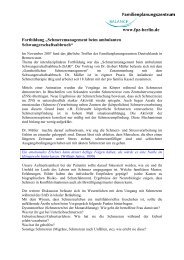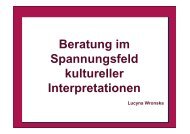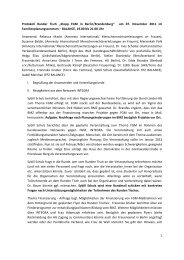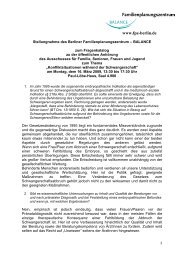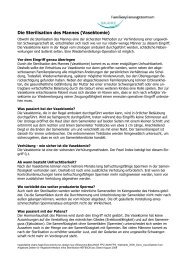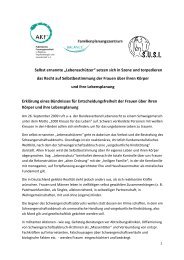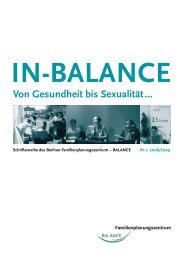Listening to African Voices - FPZ
Listening to African Voices - FPZ
Listening to African Voices - FPZ
Create successful ePaper yourself
Turn your PDF publications into a flip-book with our unique Google optimized e-Paper software.
“The problem of female circumcision is complex. We need<strong>to</strong> sit down <strong>to</strong>gether as <strong>African</strong>s and look at our culture.There is need <strong>to</strong> determine what needs <strong>to</strong> be preserved,what is good and what is bad. We have <strong>to</strong> make the decisionwhich parts of our culture we want <strong>to</strong> leave behind.There has <strong>to</strong> be a refl ection on the advantages and disadvantages.”(man of Gambian origin)5.8.2.1. Inclusion of major stakeholdersSuccessful awareness raising includes the implication of differentstakeholders. The recommended parties <strong>to</strong> involve inactivities were:• Health care workers: paediatricians, midwives, gynaecologistsand social workers in contact with immigrants,• Existing migrant projects (such as MIMI, the Aids-Hilfe,Adefra),• <strong>African</strong> entrepreneurs,• Representatives of <strong>African</strong> associations (women groups,cultural groups etc.) and• Religious leaders (imams, priests and pas<strong>to</strong>rs).5.8.2.2. Adopt a gender-sensitive approachThe participants also emphasised the need <strong>to</strong> adopt differentstrategies when approaching men and women. As FGM/Cis a very sensitive <strong>to</strong>pic that is associated with very intimatedetails, it was recommended that men’s and women’sgroups be worked with separately during activities related <strong>to</strong>FGM/C. Furthermore, immigrant women are more difficult<strong>to</strong> mobilise for group activities and should be encouraged <strong>to</strong>participate in activities over a long period of time. Men, onthe other hand, can be easily brought <strong>to</strong>gether for sporadicactivities.“Another suggestion would be, when you discuss questionsof an intimate nature, that you work separately withmen and women and <strong>to</strong> have women work with womenand men work with men.” (man of Beninese origin)“Women need a long-term project and awareness-raisingprogram. Men are more fl exible.” (woman of Kenyanorigin)5.8.2.3. Work with groups and not with individualsSeveral participants also recommended that we focus ongroup activities rather than on sensitising individuals. As asocial convention, the abolition of FGM/C demands a changein social values and behaviour. Such changes are possibleonly if the group as a whole starts <strong>to</strong> question the conventionand <strong>to</strong> decide <strong>to</strong> abandon it.“How <strong>to</strong> encourage abandoning it? […] the focus shouldbe on the community and not an individual family. Mostly,at least <strong>to</strong> the society I came from, tradition is the constitution.Everybody abides by that constitution. Therefore,it is good <strong>to</strong> focus on the general public rather than onan individual. One may invest much time and resources<strong>to</strong> convince a single family. But it might seem that thatindividual family is convinced and has expressed its willingness<strong>to</strong> abandont a practice. But as long as that familyis within its society, it has no chance of abandoning thepractice that it was advised <strong>to</strong> s<strong>to</strong>p. Impossible! So thefirst mechanism should be <strong>to</strong> focus on the group ratherthan on the individual.” (man, key informant of Ethiopianorigin)5.8.2.4. Use traditional resources of the practicing societyOne participant from Ethiopia also suggested that we modifythe traditional sayings and legends of their community.These folklores are perceived as traditional laws and cannotbe disrespected. He suggested that the folklore encouragingFGM/C should be rewritten and disseminated as countersayings<strong>to</strong> FGM/C.“The second suggestion is that you produce counter folklorewhich challenges the current folklore that justifies thepractice. When I talk <strong>to</strong> German friends, they don’t understandhow folklore should be so important <strong>to</strong> us. They areunwritten laws everybody should abide by. I knew a lo<strong>to</strong>f folklore justifying the importance of FGM. This folkloreshould be collected and then counter-folklore producedand carefully injected in<strong>to</strong> the society. The new folklorecan later become the unwritten laws <strong>to</strong> followed.” (man,key informant of Ethiopian origin)5.8.2.5. Communication channelsSome participants suggested that we make use of media thatis commonly used by <strong>African</strong>s <strong>to</strong> communicate messages. Wewere advised, for instance, <strong>to</strong> post information on web pagesor radio channels of specific <strong>African</strong> countries or <strong>to</strong> publishinformation in printed media like the journal “Jeune Afrique”(for more details on media preferences of <strong>African</strong> communities,see section 5.10). Other ideas were <strong>to</strong> spread messagesvia common meeting sites of <strong>African</strong> immigrants such asAfro Shops, hair dressing saloons and <strong>African</strong> restaurants.5.8.3. Provide assistance <strong>to</strong> women and men who need helpwith problems related <strong>to</strong> FGM/CAssisting women and men affected by the harmful effects ofFGM/C was also recommended as a strategy <strong>to</strong> promote theabandonment of FGM/C. Social workers or gynaecologists82<strong>Listening</strong> <strong>to</strong> <strong>African</strong> <strong>Voices</strong>






